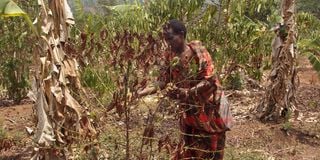Prime
Climate change scares farmers

A farmer in Lwengo District examines a wilting coffee tree under drought. PHOTO/MICHEAL J SSALI
What you need to know:
- Focus on climate change measures,.
One of the most discussed topics globally in the past few weeks has been the UN climate change conference (COP26) in Glasgow, in the UK that began last Monday.
Climate change or global warming is no longer an issue to be discussed by a few highly educated people in universities and research organisations; it is now a reality to farmers, agriculturists, and environmentalists nearly everywhere.
The world is warming up and making it harder to produce crops and to keep livestock.
Just imagine a situation when human food crops such as maize and beans cannot be produced due to long droughts and when there is no grass for cattle, goats and sheep to feed on.
Who has forgotten the effect that the long dry spell we have gone through in most parts of Uganda has had on cash crops such as coffee? Farmers saw the coffee crop almost drying up which is bound to result in much less coffee harvests next year for Uganda.
In its report dated October 27, 2021, the Rome based International Fund for Agricultural Development (IFAD) stated: “If no changes are made to agricultural practices or global policies, erratic weather patterns, drier conditions and an increase in temperature by 2°C will have a devastating impact on yields of staple and cash crops grown by small-scale farmers in parts of Angola, Lesotho, Malawi, Mozambique, Rwanda, Uganda, Zambia and Zimbabwe.”
There are lots of climate change mitigation measures being carried out in Uganda today such as the campaign to plant more trees and to preserve natural forests and wetlands.
However, such measures cannot be solely relied on in the face of a fast approaching climatic problem because as the report further says, “Falling crop yields are expected to lead to higher food prices, a decrease in food availability, and a rise in hunger and poverty.”
Measures such as tree planting or natural environment conservation will take decades to bring about the expected positive change yet Uganda’s population is projected to double by 2050.
What we therefore need more now are climate change adaptive measures such as planting drought tolerant crops and facilitating irrigation.




